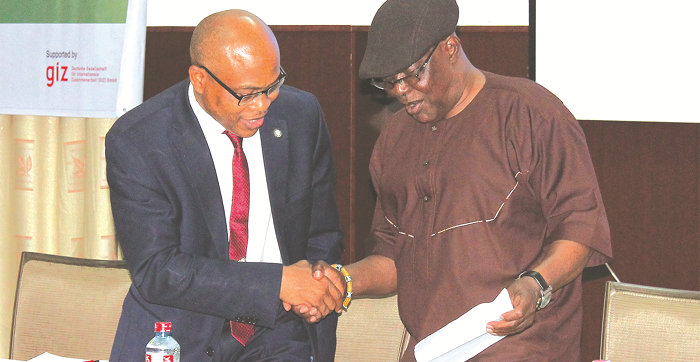
Editors discuss role of media
Ghanaian editors, senior journalists and their Nigerian counterparts have met to discuss the role of the media in promoting participatory democracy in Ghana.
Advertisement
The experience-sharing encounter, which was organised jointly by the National Media Commission (NMC), ECOWAS Commission and the German Development Organisation (GIZ), discussed issues such as hate speech, social media, media ownership, values and ethics, the media and political landscape in Ghana, managing broadcast programmes in an electioneering year, among others.
The objectives of the workshop were to enhance the capacity of the media to be professional, democratic and ethical in the performance of their role, especially during the election, and to discourage the use of the media to promote hate speech.
It was also meant to raise the awareness of the media on the existence of “ECOWAS Norms and Standards for the Media in the Promotion of Peace and Security in West Africa” and also encourage political actors from unduly manipulating the media.
New media challenges, ethical conduct
Delivering the keynote address, the Director of Political Affairs, ECOWAS Commission, Dr Remi Ajibewa, lamented that in spite of the immense benefits that new or social media presented, it had also come with unparalleled challenges, especially the inability of the appropriate authority to effectively control the misuse of social media platforms.
“Social media is widely credited with playing a major role in promoting transparency ahead of the votes that elected an opposition candidate for the presidency in Nigeria’s history. This is best practice that could be emulated from Nigeria by journalists and social bloggers in Ghana.”
“What is, however, worrisome is that the proliferation of the media has brought into question the ethical conduct of journalists and newspapers, especially during electioneering period and when many of them are little more than instruments of political advancement for their owners.”
He said with respect to newspapers it had been observed that the ownership landscape was politically polarised, with most newspapers supporting either the government or any of the opposition parties.
According to Dr Ajibewa, media diversity and content were threatened by growing monopolisation of the media market and insufficiency of financial means as well as excessive concentration of ownership, and centralised control of the media had led to the loss of editorial control and independence under the guise of censorship.
“The implication is that the media is being used as a proxy in the battle between rival political groups and in the process sowing divisiveness rather than consensus, hate speech instead of sober debate and suspicion rather than social trust.”
Dr Ajibewa urged the NMC to improve on media ownership rules to seek greater transparency, in order to protect and promote structural pluralism in audiovisual and print media and also put in place effective safeguards to prevent the risk of political influence and a lack of transparency in national media, by declaring executive positions within national media incompatible with holding a political mandate.
ECOWAS-wide initiative
The Chairman of the NMC, Mr Kwasi Gyan-Appenteng, recommended an ECOWAS-wide initiative on the media with special emphasis on the conditions necessary for the effective functioning of the media in society, to address the non-existence of, or poor remuneration of journalists.
He also called for legislation to enable the less endowed to participate in the media, especially by encouraging community radio in rural and deprived areas.
“There must be freedom of information laws that encourage free flow of non-national security information, and the release of information after certain dates must become mandatory in order to prevent the imposition of public security laws in the country. There must be a press council or regulatory commission that upholds standards, clamps down on abusive or inflammatory language calculated to promote social divisions and unrest,” he stated.
Areas for action
Ghana’s High Commissioner to Nigeria and Permanent Representative to ECOWAS, Mr William Awinador-Kanyirige, cautioned that there was a certain looming complacency driven among some journalists by leaning on freedom more than justice, which threatened to erode or slow down the effective role of the media in Africa’s development path.
He therefore, called for a re-examination of the media’s role, and suggested four key areas that needed action to prevent that from happening. These he listed as the promotion of shared values, establishment of a functional peer review mechanism, managing information communication technology (ICT) and the use of social media, and building resilience.
A Senior Advisor at GIZ, Dr Jan Grebe, said democracy required the active participation of the public and the media had a key role in providing the platform for that to happen.



